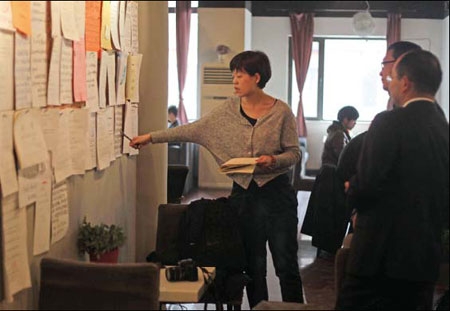Open office for new ideas

|

Through a job board at the cafe, companies can share their messages.
|
To date, Garage Cafe has hosted 30 teams, and 15 of them have successfully incubated their ideas and moved on to own offices in the city.
Such establishments are now becoming increasingly popular in big Chinese cities like Beijing and Shanghai, especially among entrepreneurs as office prices are escalating. Most of these establishments have varied focuses - the one in Zhongguancun is largely Internet-centric.
Su says most of the teams he has met are working on application development, e-commerce or online games. Most of them are doing this for the second or third time. "It is not like embarking on a new adventure as they all have prior work experience and the ability to develop new projects," Su says.
In Shanghai, the projects are more diversified. A lot of startups with ideas or projects about art, new media, environment protection or even human powered aircraft have set up shop in Xindanwei, an open working community located in the former French Concession.
Liu Yan, CEO and co-founder of Xindanwei, says startups in Shanghai are more likely to communicate with people in different fields instead of staying in one circle. "People can share their knowledge and resources, inspire each other and turn good ideas into innovative actions," she says.
Not surprisingly such places for startups are also being given their due by government officials. Last year, the Zhongguancun Technology Administration Committee opened a quick window for Garage Cafe's clients and set aside two days every month for startups to submit applications for registering companies, with the Garage Cafe taking care of most of the procedures.
However, selling coffee and desserts or undertaking events alone cannot support the running of either Garage Cafe or Xindanwei. The two establishments can barely make both ends meet. But Su defines himself as a startup unable to develop a business model for his passion.
"Cafes like ours in the United States usually get external funding support. But, such an option was not our mind at all as we wanted to establish a neutral platform."
Su says Garage Cafe is now working on an online platform but refuses to divulge more details. "This is not about making money, but more about providing better services for startups."
Liu of Xindanwei is also working on an online platform and she thinks it could be the best way to establish a business model for Xindanwei.
"Unlike Xindanwei.com, which is a free and open website, the new website will only allow registered and paid members to browse certain information," Liu says. "What's more, the new website can also help paid members to establish confidence in each other by providing a brief background introduction of each other."
Liu says Xindanwei has witnessed demand from not only startups in Shanghai, but also from those in many other nations. "The new online platform can help build a great community and bring down the barriers between nations," she says.
"In China, being free is always welcomed, but I don't think it is good. For example, when we host a free event, we will often not do our best, as it is free. The audience will also not take this seriously as it is free," Liu says. "So I think only a fee-charging model can help achieve better results."
suzhou@chinadaily.com.cn
Today's Top News
- Xi calls for promoting volunteer spirit to serve national rejuvenation
- Xi chairs CPC meeting to review report on central discipline inspection
- Reunification will only make Taiwan better
- Outline of Xi's thought on strengthening military published
- Targeted action plan to unleash consumption momentum
- Separatist plans of Lai slammed






























